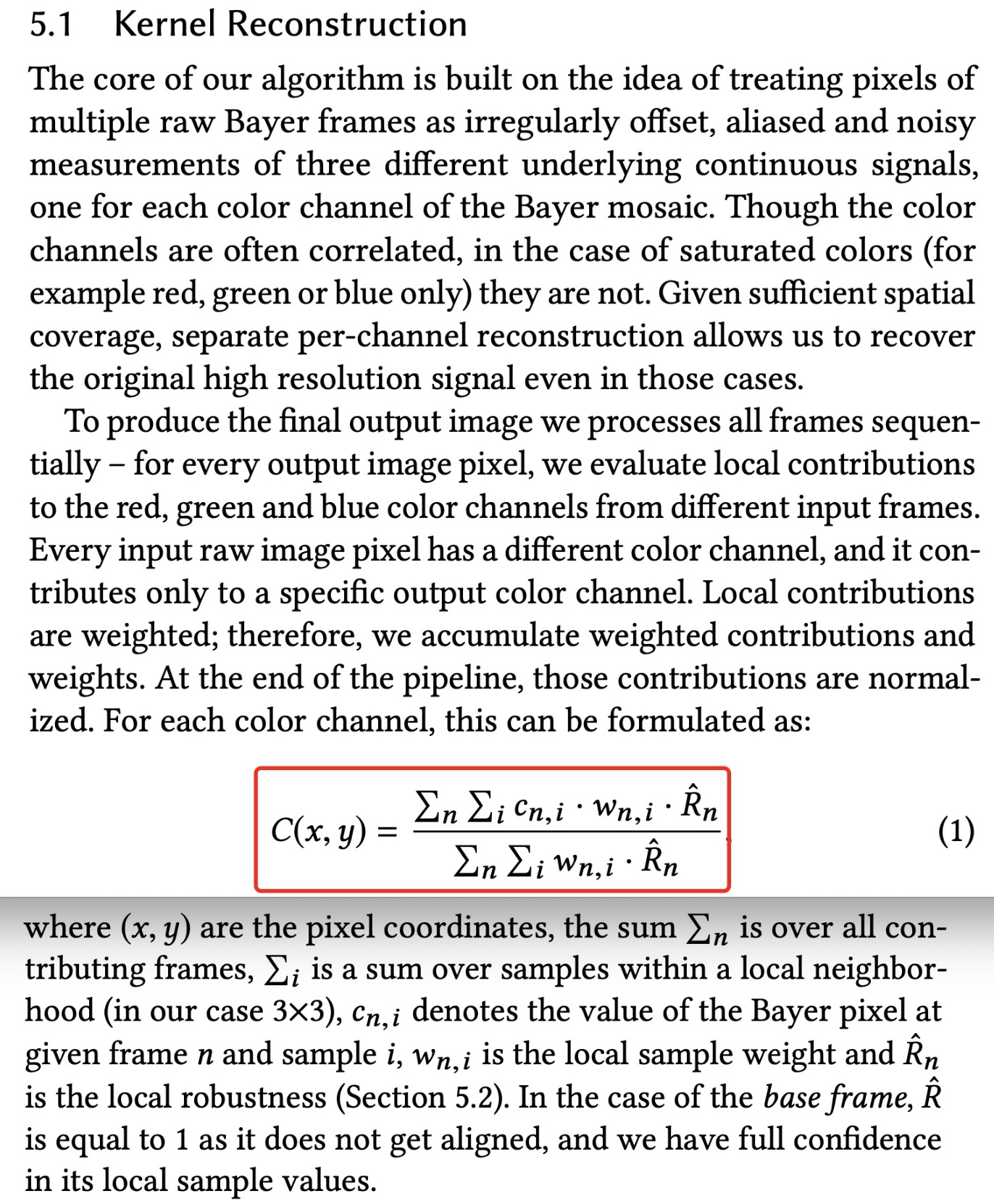An example from Handheld Multi-Frame Super-Resolution Eq. 1
The original equation:

I❤️LA implementation:
`C(x,y)` = (∑_n ∑_i c_n,i ⋅ w_n,i ⋅ R̂_n) / (∑_n ∑_i w_n,i ⋅ R̂_n)
where
c ∈ ℝ^(f×s) : the value of the Bayer pixel
w ∈ ℝ^(f×s) : the local sample weight
R̂ ∈ ℝ^f : the local robustnessI❤️LA compiled to C++/Eigen:
/*
`C(x,y)` = (∑_n ∑_i c_n,i ⋅ w_n,i ⋅ R̂_n) / (∑_n ∑_i w_n,i ⋅ R̂_n)
where
c ∈ ℝ^(f×s) : the value of the Bayer pixel
w ∈ ℝ^(f×s) : the local sample weight
R̂ ∈ ℝ^f : the local robustness
*/
#include <Eigen/Core>
#include <Eigen/Dense>
#include <Eigen/Sparse>
#include <iostream>
#include <set>
struct multi_frame_1ResultType {
double C_left_parenthesis_x_comma_y_right_parenthesis;
multi_frame_1ResultType(const double & C_left_parenthesis_x_comma_y_right_parenthesis)
: C_left_parenthesis_x_comma_y_right_parenthesis(C_left_parenthesis_x_comma_y_right_parenthesis)
{}
};
/**
* multi_frame_1
*
* @param c the value of the Bayer pixel
* @param w the local sample weight
* @param R̂ the local robustness
* @return C_left_parenthesis_x_comma_y_right_parenthesis
*/
multi_frame_1ResultType multi_frame_1(
const Eigen::MatrixXd & c,
const Eigen::MatrixXd & w,
const Eigen::VectorXd & R̂)
{
const long f = c.rows();
const long s = c.cols();
assert( c.rows() == f );
assert( w.rows() == f );
assert( w.cols() == s );
assert( R̂.size() == f );
double sum_0 = 0;
for(int n=1; n<=R̂.size(); n++){
double sum_1 = 0;
for(int i=1; i<=w.cols(); i++){
sum_1 += c(n-1, i-1) * w(n-1, i-1) * R̂[n-1];
}
sum_0 += sum_1;
}
double sum_2 = 0;
for(int n=1; n<=R̂.size(); n++){
double sum_3 = 0;
for(int i=1; i<=w.cols(); i++){
sum_3 += w(n-1, i-1) * R̂[n-1];
}
sum_2 += sum_3;
}
double C_left_parenthesis_x_comma_y_right_parenthesis = (sum_0) / double((sum_2));
return multi_frame_1ResultType(C_left_parenthesis_x_comma_y_right_parenthesis);
}
void generateRandomData(Eigen::MatrixXd & c,
Eigen::MatrixXd & w,
Eigen::VectorXd & R̂)
{
const int f = rand()%10;
const int s = rand()%10;
c = Eigen::MatrixXd::Random(f, s);
w = Eigen::MatrixXd::Random(f, s);
R̂ = Eigen::VectorXd::Random(f);
}
int main(int argc, char *argv[])
{
srand((int)time(NULL));
Eigen::MatrixXd c;
Eigen::MatrixXd w;
Eigen::VectorXd R̂;
generateRandomData(c, w, R̂);
multi_frame_1ResultType func_value = multi_frame_1(c, w, R̂);
std::cout<<"return value:\n"<<func_value.C_left_parenthesis_x_comma_y_right_parenthesis<<std::endl;
return 0;
}I❤️LA compiled to Python/NumPy/SciPy:
"""
`C(x,y)` = (∑_n ∑_i c_n,i ⋅ w_n,i ⋅ R̂_n) / (∑_n ∑_i w_n,i ⋅ R̂_n)
where
c ∈ ℝ^(f×s) : the value of the Bayer pixel
w ∈ ℝ^(f×s) : the local sample weight
R̂ ∈ ℝ^f : the local robustness
"""
import numpy as np
import scipy
import scipy.linalg
from scipy import sparse
from scipy.integrate import quad
from scipy.optimize import minimize
class multi_frame_1ResultType:
def __init__( self, C_left_parenthesis_x_comma_y_right_parenthesis):
self.C_left_parenthesis_x_comma_y_right_parenthesis = C_left_parenthesis_x_comma_y_right_parenthesis
def multi_frame_1(c, w, R̂):
"""
:param :c : the value of the Bayer pixel
:param :w : the local sample weight
:param :R̂ : the local robustness
"""
c = np.asarray(c, dtype=np.float64)
w = np.asarray(w, dtype=np.float64)
R̂ = np.asarray(R̂, dtype=np.float64)
f = c.shape[0]
s = c.shape[1]
assert c.shape == (f, s)
assert w.shape == (f, s)
assert R̂.shape == (f,)
sum_0 = 0
for n in range(1, len(R̂)+1):
sum_1 = 0
for i in range(1, w.shape[1]+1):
sum_1 += c[n-1, i-1] * w[n-1, i-1] * R̂[n-1]
sum_0 += sum_1
sum_2 = 0
for n in range(1, len(R̂)+1):
sum_3 = 0
for i in range(1, w.shape[1]+1):
sum_3 += w[n-1, i-1] * R̂[n-1]
sum_2 += sum_3
C_left_parenthesis_x_comma_y_right_parenthesis = (sum_0) / (sum_2)
return multi_frame_1ResultType(C_left_parenthesis_x_comma_y_right_parenthesis)
def generateRandomData():
f = np.random.randint(10)
s = np.random.randint(10)
c = np.random.randn(f, s)
w = np.random.randn(f, s)
R̂ = np.random.randn(f)
return c, w, R̂
if __name__ == '__main__':
c, w, R̂ = generateRandomData()
print("c:", c)
print("w:", w)
print("R̂:", R̂)
func_value = multi_frame_1(c, w, R̂)
print("return value: ", func_value.C_left_parenthesis_x_comma_y_right_parenthesis)I❤️LA compiled to MATLAB:
function output = multi_frame_1(c, w, R_hat)
% output = multi_frame_1(c, w, R̂)
%
% `C(x,y)` = (∑_n ∑_i c_n,i ⋅ w_n,i ⋅ R̂_n) / (∑_n ∑_i w_n,i ⋅ R̂_n)
%
% where
%
% c ∈ ℝ^(f×s) : the value of the Bayer pixel
% w ∈ ℝ^(f×s) : the local sample weight
% R̂ ∈ ℝ^f : the local robustness
if nargin==0
warning('generating random input data');
[c, w, R_hat] = generateRandomData();
end
function [c, w, R_hat] = generateRandomData()
f = randi(10);
s = randi(10);
c = randn(f, s);
w = randn(f, s);
R_hat = randn(f,1);
end
R_hat = reshape(R_hat,[],1);
f = size(c, 1);
s = size(c, 2);
assert( isequal(size(c), [f, s]) );
assert( isequal(size(w), [f, s]) );
assert( numel(R_hat) == f );
sum_0 = 0;
for n = 1:size(R_hat,1)
sum_1 = 0;
for i = 1:size(w,2)
sum_1 = sum_1 + c(n, i) * w(n, i) * R_hat(n);
end
sum_0 = sum_0 + sum_1;
end
sum_2 = 0;
for n = 1:size(R_hat,1)
sum_3 = 0;
for i = 1:size(w,2)
sum_3 = sum_3 + w(n, i) * R_hat(n);
end
sum_2 = sum_2 + sum_3;
end
C_x_y = (sum_0) / (sum_2);
output.C_x_y = C_x_y;
end
I❤️LA compiled to LaTeX:
\documentclass[12pt]{article}
\usepackage{mathdots}
\usepackage[bb=boondox]{mathalfa}
\usepackage{mathtools}
\usepackage{amssymb}
\usepackage{libertine}
\DeclareMathOperator*{\argmax}{arg\,max}
\DeclareMathOperator*{\argmin}{arg\,min}
\usepackage[paperheight=8in,paperwidth=4in,margin=.3in,heightrounded]{geometry}
\let\originalleft\left
\let\originalright\right
\renewcommand{\left}{\mathopen{}\mathclose\bgroup\originalleft}
\renewcommand{\right}{\aftergroup\egroup\originalright}
\begin{document}
\begin{center}
\resizebox{\textwidth}{!}
{
\begin{minipage}[c]{\textwidth}
\begin{align*}
\textit{C(x,y)} & = \frac{\sum_\mathit{n} \sum_\mathit{i} \mathit{c}_{\mathit{n}, \mathit{i}} \cdot \mathit{w}_{\mathit{n}, \mathit{i}} \cdot \textit{R̂}_{ \mathit{n} }}{\sum_\mathit{n} \sum_\mathit{i} \mathit{w}_{\mathit{n}, \mathit{i}} \cdot \textit{R̂}_{ \mathit{n} }} \\
\intertext{where}
\mathit{c} & \in \mathbb{R}^{ \mathit{f} \times \mathit{s} } \text{ the value of the Bayer pixel} \\
\mathit{w} & \in \mathbb{R}^{ \mathit{f} \times \mathit{s} } \text{ the local sample weight} \\
\textit{R̂} & \in \mathbb{R}^{ \mathit{f}} \text{ the local robustness} \\
\\
\end{align*}
\end{minipage}
}
\end{center}
\end{document}
I❤️LA LaTeX output: